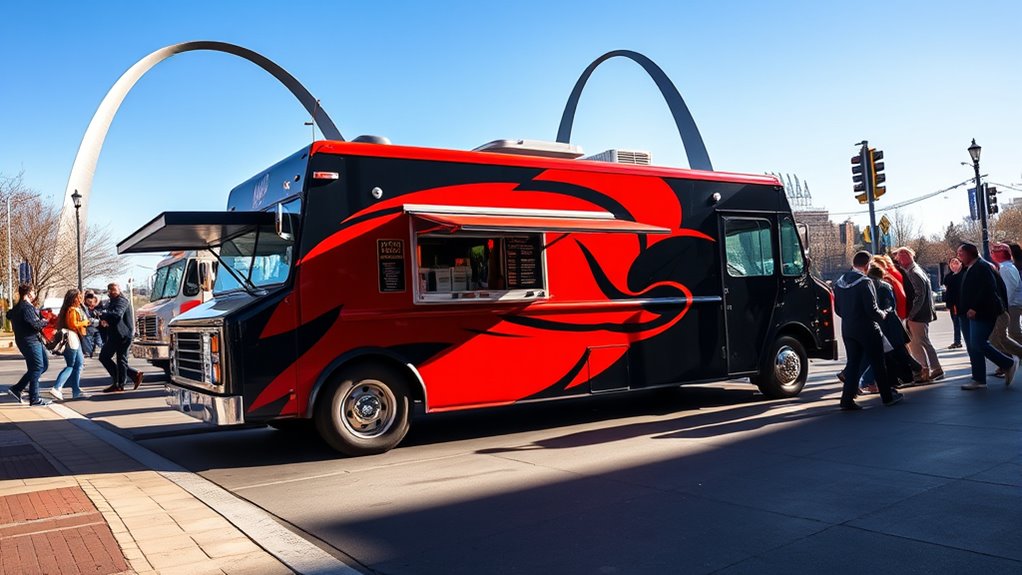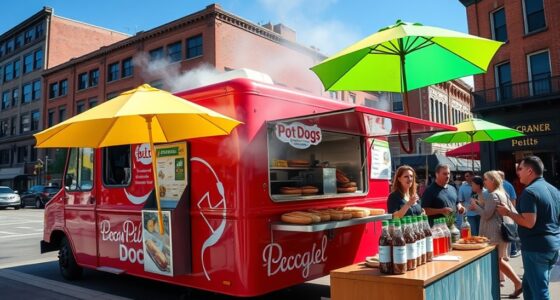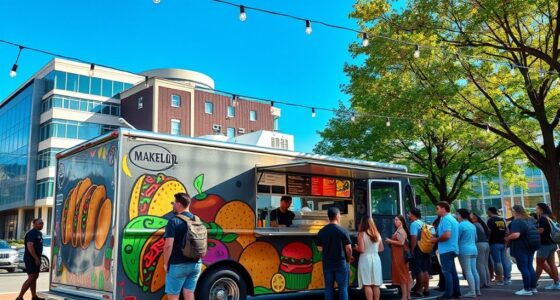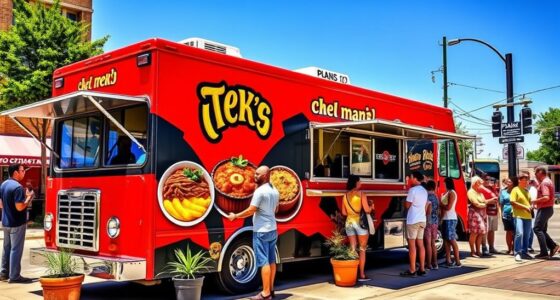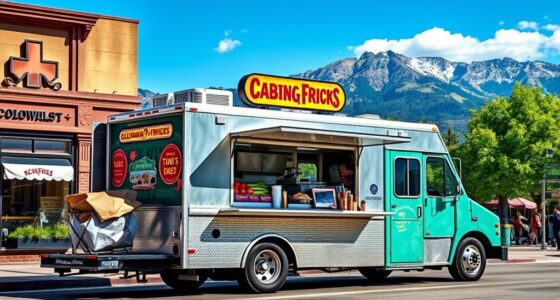To start a food truck in St. Louis, you’ll need to research local permits, health code requirements, and parking regulations. Budget for vehicle costs, insurance, and licenses, and explore local grants or financing options. Build a strong brand with appealing menu items and effective marketing on social media. Focus on efficient operations, quality control, and community engagement. If you continue exploring, you’ll discover detailed steps to launch and grow your food truck successfully.
Key Takeaways
- Research and obtain necessary permits and licenses from St. Louis health department and city agencies.
- Develop a comprehensive business plan, identify funding options, and secure liability insurance.
- Choose a suitable food truck, budget for vehicle costs, and ensure compliance with local regulations.
- Design a unique brand and marketing strategy, leveraging social media and community events.
- Optimize operations with proper kitchen setup, menu pricing, quality control, and technology tools.
Starting Your Culinary Journey
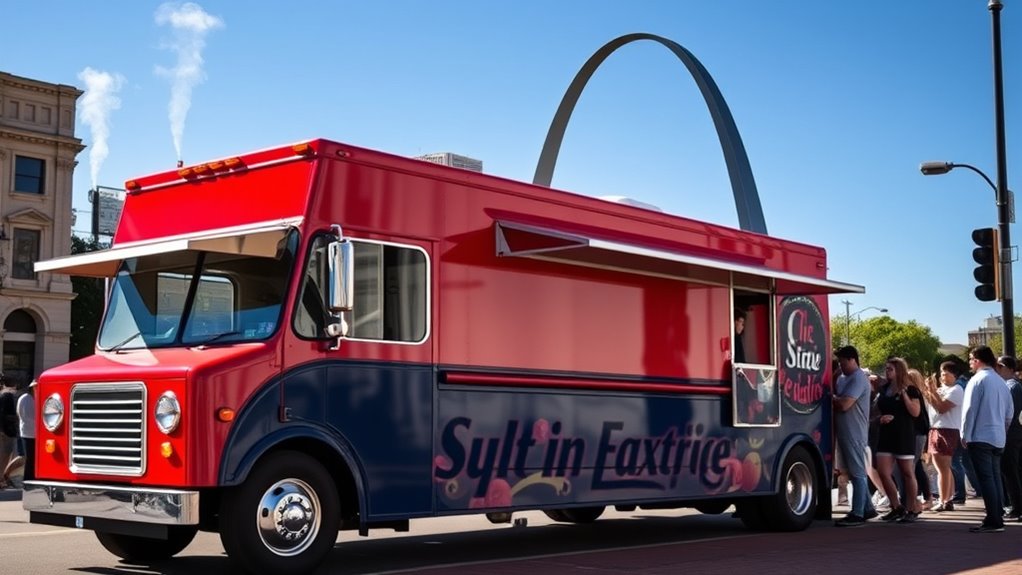
Beginning your culinary journey with a food truck in St. Louis sets the stage for success. To stand out, focus on food truck branding that truly reflects your unique style and menu. A strong brand helps attract attention and makes your truck memorable. As customers try your food, prioritize building customer loyalty by providing consistent quality and excellent service. Engaging visuals, a catchy name, and a clear message can create a buzz in the local community. Remember, branding isn’t just about looks—it’s about creating an experience that keeps people coming back. When you develop a recognizable identity and foster genuine connections, your food truck can thrive in St. Louis’s vibrant food scene. Additionally, understanding the importance of branding strategies can give you a competitive edge. Start smart, stay consistent, and let your passion drive your journey.
Understanding Local Requirements
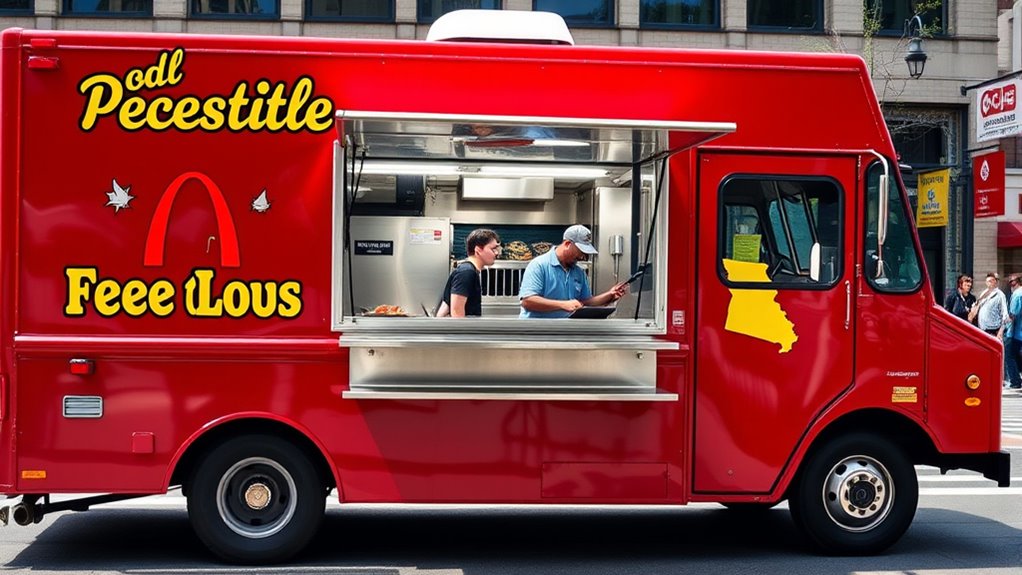
To get started, you’ll need to understand the application process and associated fees for operating a food truck in St. Louis. You also have to meet sanitation protocols and keep proper records to stay compliant. Additionally, knowing the designated street parking zones is essential to prevent fines and ensure your truck is where customers can find it. Considering the importance of maintaining your vehicle and equipment, it’s advisable to regularly check the eye patch benefits to keep your appearance fresh and professional.
Application Process and Fees
Securing the necessary permits and paying applicable fees are essential steps to legally operate your food truck in St. Louis. The application process involves obtaining food truck certifications, which validate your compliance with safety and health standards. You’ll also need to pay different fees depending on your truck’s size and operation scope. Here’s what to expect:
| Step | Description |
|---|---|
| Permit Application | Submit your application at the local health department. |
| Fee Payment | Pay the required fees online or in person. |
| Permit Renewal Procedures | Renew your permits annually to stay compliant. |
Be aware of permit renewal procedures to avoid disruptions. Staying current ensures your food truck remains legal and competitive.
Sanitation Protocols and Record-Keeping
Since maintaining proper sanitation is essential for passing inspections and ensuring customer safety, you must understand and follow St. Louis’s requirements. You need to have functional handwashing stations readily accessible on your food truck, as these are crucial during sanitation inspections. Regularly clean and sanitize all surfaces, utensils, and equipment, and keep detailed records of your cleaning schedules and procedures. Keep a log of daily sanitation activities, including handwashing, equipment sanitization, and waste disposal. Inspection officials will review these records during sanitation inspections, so accurate and up-to-date documentation is vital. Staying compliant not only helps you pass inspections but also builds customer trust and upholds your food truck’s reputation for safety and cleanliness.
Designated Street Parking Zones
Understanding the designated street parking zones in St. Louis is essential for your food truck business. You must identify specific areas where parking is permitted and avoid zones reserved for street cleaning or other uses. Check local signage carefully, as some zones require parking permits, which you’ll need to obtain from city offices. These permits guarantee you’re legally allowed to park during business hours and help you avoid fines or towing. Be aware of street cleaning schedules, as parking restrictions often tighten on those days. Planning your parking around these rules helps keep your operations smooth and compliant with local regulations. By understanding these zones and securing the necessary permits, you’ll ensure your food truck stays legally parked and ready to serve.
Setting Up Your Base of Operations
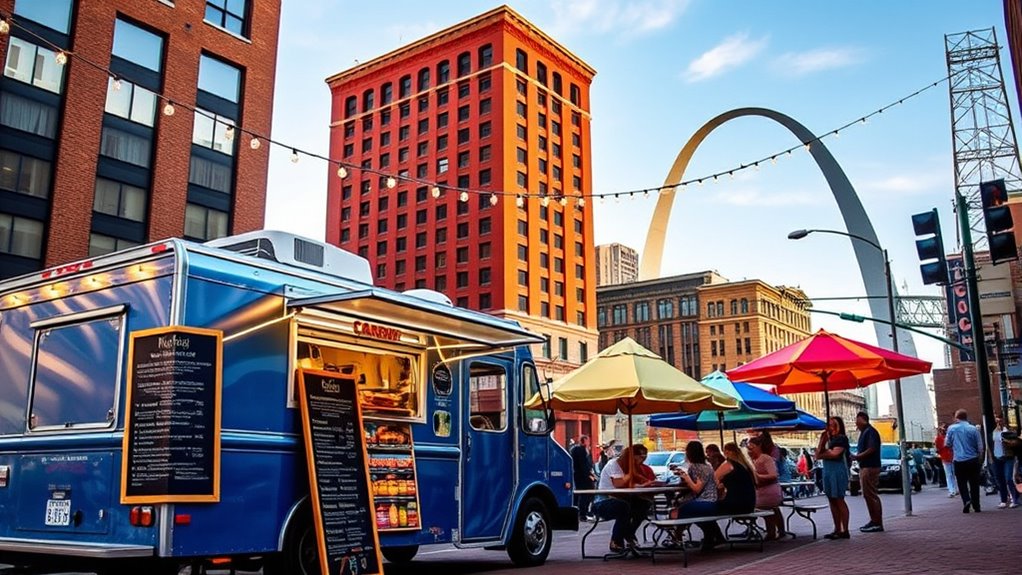
Setting up your base of operations means choosing a shared kitchen that meets licensing requirements and suits your needs. You’ll also want to plan a custom kitchen layout to maximize efficiency and safety. These steps guarantee your food truck runs smoothly and complies with local regulations. Incorporating wall organization systems can help keep your workspace tidy and efficient, making day-to-day operations more manageable.
Shared Kitchen Licensing Requirements
To legally operate your food truck in St. Louis, you need to meet shared kitchen licensing requirements. Using a shared kitchen space is a common way to obtain the necessary food truck permits efficiently. You must verify the facility complies with local health department standards and is properly licensed for commercial food production. This involves submitting documentation proving the shared kitchen’s licensing and passing health inspections. The shared kitchen licensing process requires detailed records of food handling procedures and sanitation practices. Additionally, you’ll need to coordinate with city officials to confirm that your setup qualifies for the food truck permits. By securing these licenses and permits, you establish a compliant and reliable base of operations for your food truck business.
Custom Kitchen Layout Planning
After securing the necessary licenses for your shared kitchen, the next step is designing a custom layout that maximizes efficiency and meets your specific operational needs. Focus on essential kitchen ventilation to ensure proper airflow and safety, which is vital for compliance and comfort. Plan your space to streamline equipment installation, placing appliances logically to reduce movement and improve workflow. Consider the size and placement of your cooking stations, prep areas, and storage to enhance productivity. Proper ventilation systems should be integrated seamlessly with your layout, preventing heat buildup and ensuring air quality. By thoughtfully designing your kitchen, you’ll create a functional environment that supports smooth operations and compliance with health standards.
Budgeting and Financing Your Food Truck
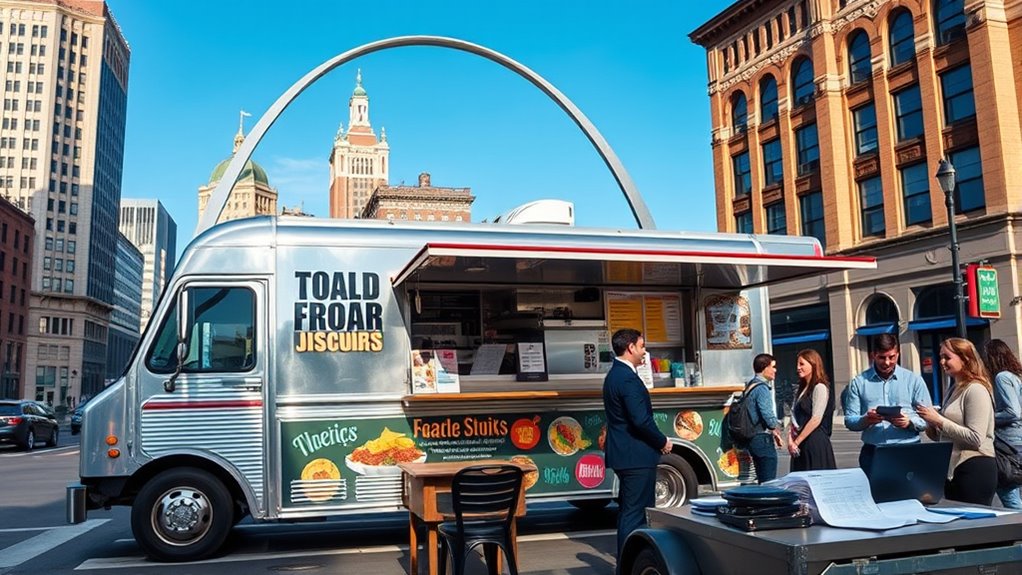
To get your food truck off the ground, you need to plan your budget carefully, starting with the initial vehicle costs. Explore local small business grants that could help ease your upfront expenses, and don’t forget to include liability coverage to protect your business. With clear financing strategies, you’ll be better equipped to turn your food truck dreams into reality. Researching best anime movies can also inspire creativity and storytelling ideas for your menu or branding.
Initial Vehicle Purchase Costs
Budgeting for your food truck’s initial purchase involves understanding the range of costs you’ll face. New trucks can cost between $70,000 and $150,000, while used vehicles might be available for $20,000 to $50,000. Beyond the purchase price, consider vehicle maintenance costs, which can add up over time, especially if you choose an older model. Insurance coverage is another essential expense; it protects your investment and ensures compliance with local regulations. Premiums depend on factors like vehicle type, coverage limits, and your driving history. Properly budgeting for these costs helps you avoid surprises and ensures your food truck business starts on solid financial footing. Remember, investing in a reliable vehicle and adequate insurance is key to long-term success.
Local Small Business Grants
Securing local small business grants can provide a essential financial boost when starting your food truck in St. Louis. These grants, offered by city agencies, non-profits, and economic development programs, can help you cover startup costs without taking on debt. To access small business funding through local grants, research opportunities specific to St. Louis’s small business ecosystem. Prepare a solid business plan and gather necessary documents to strengthen your application. Applying early and tailoring your proposal to grant requirements increases your chances. Keep in mind, these grants don’t need repayment, making them an attractive option for financing your food truck venture. Leveraging local business grants can ease your budgeting process and help you focus on growing your food truck business in St. Louis.
Liability Coverage for Food Trucks
Understanding liability coverage is essential when budgeting and financing your food truck in St. Louis. Liability insurance protects you from financial loss if someone gets injured or if your truck causes damage. Coverage options vary, so it’s vital to choose policies that fit your needs and budget. Consider factors like general liability, vehicle coverage, and product liability. To visualize, here’s a quick comparison:
| Coverage Type | Description | Estimated Cost |
|---|---|---|
| General Liability | Protects against customer injuries | $500 – $1,500/year |
| Vehicle Insurance | Covers accidents involving your truck | $1,000 – $3,000/year |
| Product Liability | Protects against food-related claims | Varies |
| Workers’ Compensation | Covers employee injuries | Depends on staff size |
Having the right liability insurance guarantees you’re protected as you grow your food truck business.
Designing Your Menu and Pricing Strategy
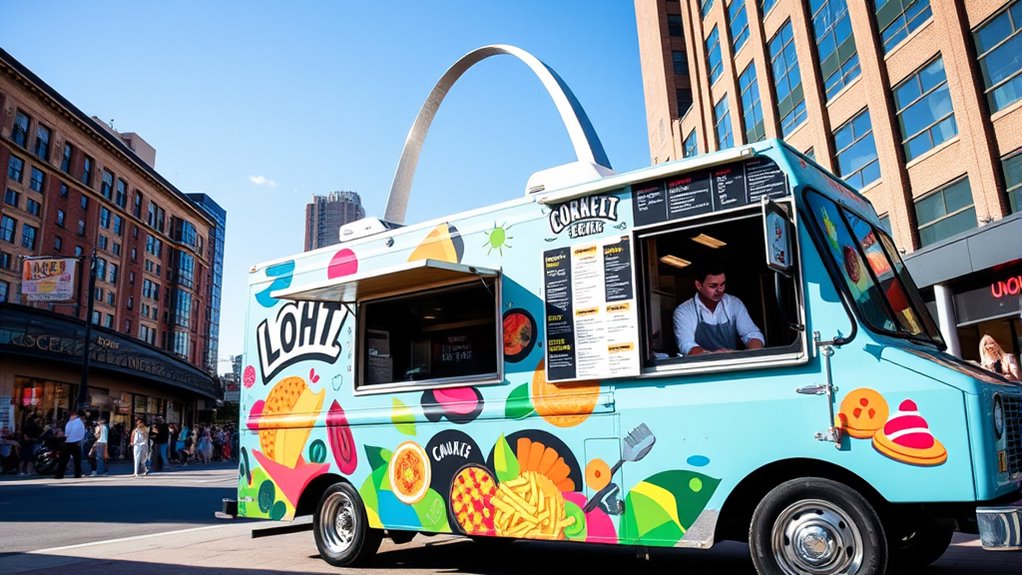
When designing your menu, focus on creating dishes that appeal to a wide range of tastes in St. Louis. To keep profits in check, accurately calculate ingredient costs using methods like recipe costing or market price comparisons. This approach helps you set fair prices while ensuring your food truck remains profitable. Additionally, considering versatility of hybrid bikes can inspire menu flexibility, allowing you to adapt offerings based on customer preferences and seasonal ingredients.
Crafting Dishes for Diverse Palates
Designing your menu and pricing strategy requires careful consideration of your target audience’s diverse tastes. In St. Louis, a city known for its cultural mix, offering fusion cuisine can appeal to a broad range of customers. Incorporate dishes that reflect different culinary traditions to attract variety and showcase creativity. Additionally, prioritize dietary accommodations like gluten-free, vegan, or allergen-free options to meet evolving customer needs. Balancing unique, multicultural dishes with familiar favorites ensures you cater to various preferences while maintaining affordability. Keep your pricing competitive, considering ingredient costs and perceived value. Flexibility in your menu allows you to adapt as trends shift and customer feedback guides your offerings, helping you craft a menu that appeals to diverse palates and keeps your food truck thriving.
Ingredient Cost Calculation Methods
Accurately calculating ingredient costs is the foundation for setting profitable menu prices. To do this effectively, you need a solid method for ingredient sourcing and cost analysis. Start by tracking the prices of ingredients from your suppliers, noting any fluctuations over time. Break down each dish into its core components and determine the exact amount used per serving. Then, divide the total cost of ingredients by the number of servings to find your cost per dish. This detailed cost analysis helps you identify high-cost items and adjust your menu or pricing accordingly. By consistently evaluating ingredient sourcing and performing precise calculations, you guarantee your prices cover costs while remaining competitive, ultimately maximizing your profit margins.
Technology and Operations
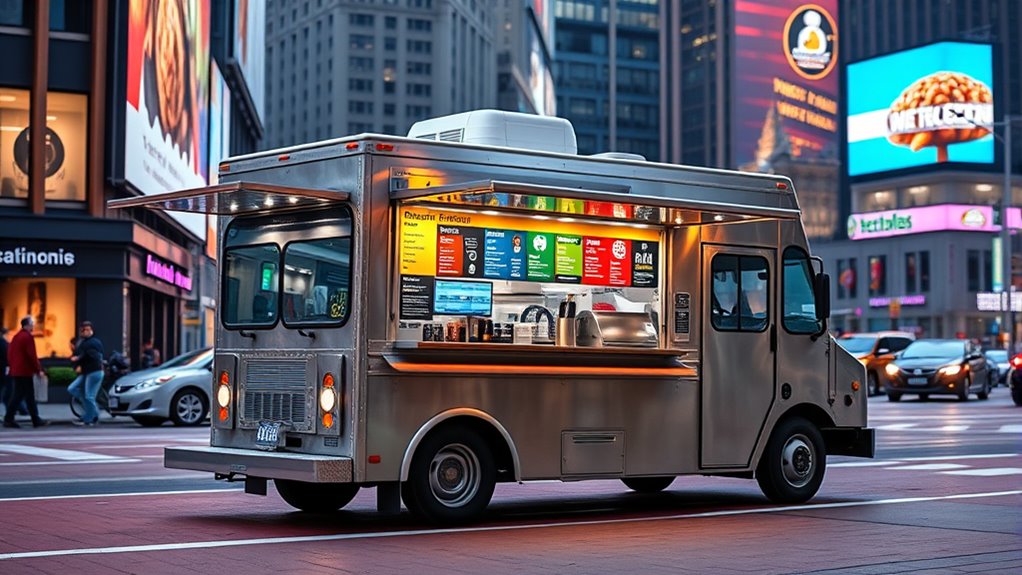
To keep your food truck running smoothly, you’ll want reliable technology like mobile card readers to process sales quickly and securely. Real-time stock tracking software helps you stay on top of inventory, preventing shortages or overstocking. Implementing these tools streamlines operations and keeps your business efficient on busy days.
Mobile Card Readers for Sales
Mobile card readers have become essential tools for food truck operators in St. Louis. They enable quick, convenient payments, especially with contactless payments gaining popularity among customers. These devices streamline the sales process, allowing you to serve more customers efficiently. Plus, they prioritize transaction security, ensuring sensitive data remains protected. With features like encrypted data transmission, you can confidently process payments without worrying about breaches. Mobile card readers also integrate seamlessly with smartphones or tablets, reducing the need for bulky equipment. This flexibility helps you stay mobile and adaptable during busy hours or outdoor events. Investing in reliable, secure mobile card readers enhances customer experience and builds trust, making them a must-have for any successful food truck business in St. Louis.
Real-time Stock Tracking Software
Implementing real-time stock tracking software is essential for keeping your food truck operations efficient and responsive. It streamlines inventory management, giving you instant updates on stock levels, so you avoid shortages or overstocking. You can quickly identify which ingredients need restocking and communicate with suppliers more effectively, reducing delays. The software helps you track usage patterns, optimize inventory turnover, and minimize waste. Staying on top of your supplies ensures smooth service and happy customers. Additionally, real-time data allows you to make informed decisions, adjust menus, and control costs. With integrated supplier communication, you can automate reordering processes, saving time and reducing errors.
- Simplifies inventory management
- Enhances supplier communication
- Prevents stockouts and overstocking
- Provides real-time usage insights
- Streamlines reordering processes
Marketing and Growing Your Presence
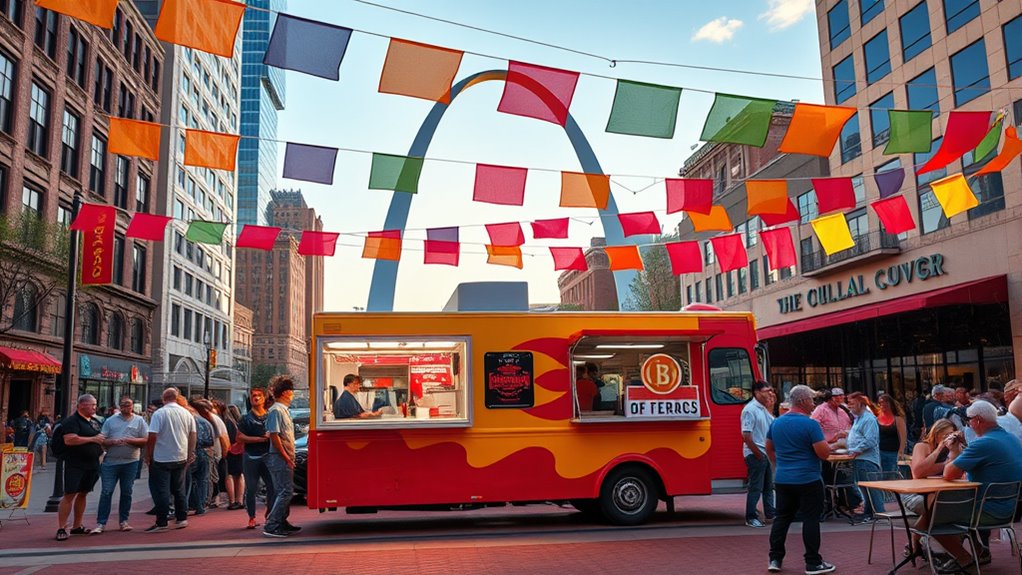
To build your presence, focus on scheduling appearances at seasonal events around St. Louis to attract new customers. Use Instagram Stories and promotions to engage your followers and create buzz around your truck. Consistent, strategic marketing like this will help grow your customer base and boost your visibility.
Scheduling Seasonal Event Appearances
Scheduling seasonal event appearances is essential for increasing your food truck’s visibility and attracting new customers throughout the year. Proper seasonal event planning guarantees you target the right audiences at the right times. Focus on outdoor venue selection to maximize foot traffic and ambiance. To succeed, research local festivals, farmers’ markets, and community celebrations aligned with your menu. Reach out early to event organizers to secure spots and negotiate placement. Keep your schedule flexible to adapt to weather changes and unexpected opportunities. Consider partnering with local businesses for joint promotions. Regularly updating your calendar helps maintain consistent visibility. Remember, well-planned seasonal appearances boost brand recognition and drive repeat business.
- Identify popular local events and festivals
- Coordinate with event organizers early
- Choose outdoor venues with high foot traffic
- Incorporate seasonal menu specials
- Promote your appearances on social media
Engaging Instagram Stories and Promotions
Engaging Instagram Stories and promotions are powerful tools for building your food truck’s online presence and attracting new customers. By sharing behind-the-scenes content, daily specials, and customer shoutouts, you boost Instagram engagement and keep followers interested. Use promotional strategies like limited-time offers or countdowns to create urgency and excitement. Consistently posting Stories that highlight your menu, location updates, or event appearances helps keep your audience captivated and enthusiastic to visit. Incorporate eye-catching visuals and clear calls-to-action to encourage interaction. Respond promptly to comments and direct messages to foster community. Remember, the key to success is authenticity and consistency—show your personality, and your followers will become loyal customers passionate to support your food truck.
Maintaining Quality and Consistency
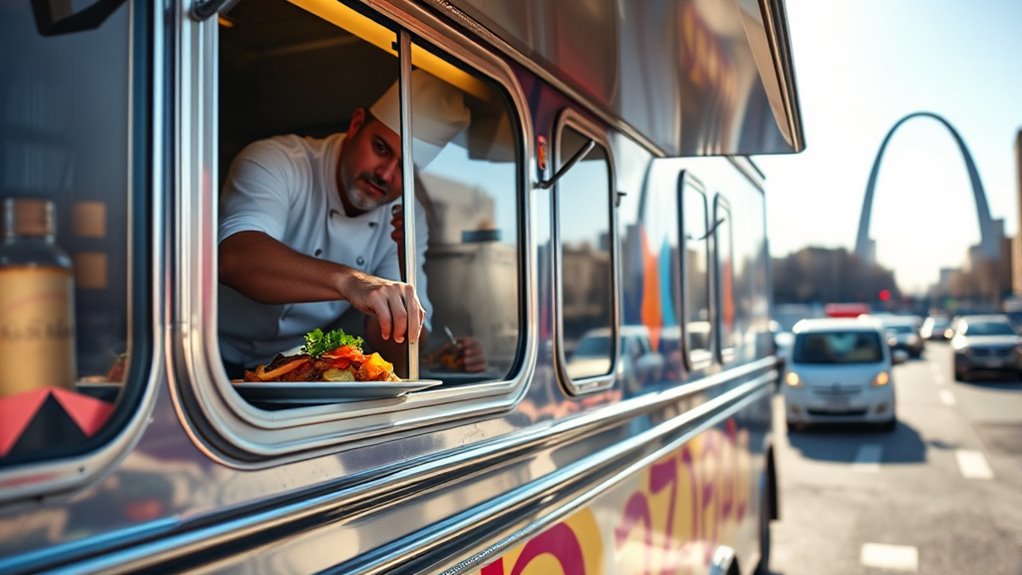
Maintaining quality and consistency is essential for building a loyal customer base and standing out in the competitive St. Louis food scene. To do this, prioritize food safety and quality assurance at every step. Consistent food preparation and presentation keep customers happy and coming back. Regularly train your staff to follow standardized recipes and hygiene practices. Implement quality checks to catch issues early. Keep ingredients fresh and stored properly to avoid food safety risks. Document your processes to ensure consistency, and solicit customer feedback for continuous improvement. Staying vigilant with food safety protocols and quality assurance measures helps protect your reputation. Remember, consistent, high-quality food creates trust and encourages repeat business.
- Use standardized recipes
- Train staff regularly
- Monitor ingredient freshness
- Follow strict hygiene protocols
- Track feedback for improvements
Frequently Asked Questions
What Permits Are Needed for Nighttime Food Truck Operations in St. Louis?
You’ll need to obtain nighttime licensing and evening permits to operate your food truck at night in St. Louis. The process involves applying through the St. Louis Department of Public Safety and ensuring your truck meets health and safety standards. Make sure to check if specific zones require additional permits. Securing these licenses allows you to serve customers legally during nighttime hours and avoid fines or shutdowns.
Are There Specific Health Inspector Requirements Unique to St. Louis?
In St. Louis, you must meet specific health inspector requirements for your food truck. You need to guarantee health code compliance by following local regulations, which include passing regular inspection procedures. The health department looks at your food prep area, sanitation, and storage practices. Be prepared for routine inspections, and keep detailed records to demonstrate ongoing compliance. Staying proactive helps you avoid violations and ensures your food truck operates smoothly.
How Can I Find Local Food Truck Events and Festivals?
You can find local food truck events and festivals by exploring food truck networking groups on social media platforms like Facebook and Instagram. Additionally, check out local event calendars, city websites, and community boards for upcoming festivals. Attending these events helps you connect with other vendors, gain exposure, and learn about opportunities to showcase your food truck in St. Louis. Stay active online and in person to maximize your chances.
What Are Common Challenges Faced by Food Truck Owners in St. Louis?
You’ll face common challenges like balancing menu customization with efficiency and maintaining customer retention. Adapting your menu to local tastes can slow service, so streamline options for quick prep. Building loyal customers requires engaging with your community and offering consistent quality. Weather unpredictability and parking restrictions also pose hurdles. Staying flexible, listening to customer feedback, and promoting your brand help you overcome these obstacles and grow your food truck business in St. Louis.
How Do I Build Relationships With Local Suppliers and Vendors?
To build relationships with local suppliers and vendors, focus on local sourcing by visiting markets and farms regularly. Attend vendor networking events and join local business groups to connect with potential partners. Be consistent, supportive, and transparent about your needs, which helps foster trust. Establish clear communication and show appreciation for their quality products. Over time, these efforts create strong, mutually beneficial partnerships that support your food truck’s success.
Conclusion
Starting a food truck in St. Louis is an exciting adventure. Did you know that the city hosts over 400 food trucks, with many seeing a 20% growth annually? By understanding local rules, crafting a unique menu, and engaging your community, you’ll stand out. Keep your quality high and adapt as you go. With passion and persistence, your food truck can become a beloved part of St. Louis’s vibrant dining scene.
